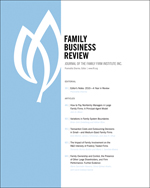Mapping Out the Landscape of Family Business
As the crucial domain of family business evolves, researchers and practitioners continue to strive for greater understanding of this rapidly growing and changing field. Dr. Ritch L. Sorenson of the University of St. Thomas joined Assistant Editor Karen Vinton on the Family Business Review podcast to discuss his article, “The Landscape of Family Business Outcomes: A Summary and Numerical Taxonomy of Dependent Variables,” co-authored by Andy Yu of the University of Wisconsin–Whitewater, G. T. Lumpkin of Syracuse University, and Keith H. Brigham of Texas Tech University. The paper was published in the FBR March 2012 issue, and this year received an honorable mention for the journal’s Best Paper Award. In it, the authors have created a two-dimensional “landscape” which maps out the family business domain in terms of dependent variables/outcomes.
 Dr. Sorenson describes how this “landscape” helps practitioners to see the big picture: “Many people think they’re going to have a succession in their family business, but they haven’t planned for it,” he told Dr. Vinton. “Why? Because they’ve focused all of their time on short-term business outcomes…. You need to think long term in terms of business, you need to think about the family and how it’s connected to the business in the short term, and ultimately you need to think about long-term family issues related to succession of ownership and leadership in the business.” Click here to download the podcast interview, or subscribe on iTunes by following this link, and read the complete article here.
Dr. Sorenson describes how this “landscape” helps practitioners to see the big picture: “Many people think they’re going to have a succession in their family business, but they haven’t planned for it,” he told Dr. Vinton. “Why? Because they’ve focused all of their time on short-term business outcomes…. You need to think long term in terms of business, you need to think about the family and how it’s connected to the business in the short term, and ultimately you need to think about long-term family issues related to succession of ownership and leadership in the business.” Click here to download the podcast interview, or subscribe on iTunes by following this link, and read the complete article here.
 Ritch L. Sorenson is the Opus Endowed Chair in Family Business and the Director of the Family Business Center at the University of St. Thomas in Minneapolis. The Center includes family business research, outreach, and education, including a major in family business. Ritch has been an Associate Editor and a Guest Editor of a special issue for Family Business Review, and editor for a forthcoming book on Social Capital in Family Business.
Ritch L. Sorenson is the Opus Endowed Chair in Family Business and the Director of the Family Business Center at the University of St. Thomas in Minneapolis. The Center includes family business research, outreach, and education, including a major in family business. Ritch has been an Associate Editor and a Guest Editor of a special issue for Family Business Review, and editor for a forthcoming book on Social Capital in Family Business.
 Karen L. Vinton, Ph.D., is assistant editor of FBR and a 1999 Barbara Hollander Award winner and Professor Emeritus of Business at the College of Business at Montana State University, where she founded the University’s Family Business Program. An FFI Fellow, she has served on its Board of Directors and chaired the Body of Knowledge committee.
Karen L. Vinton, Ph.D., is assistant editor of FBR and a 1999 Barbara Hollander Award winner and Professor Emeritus of Business at the College of Business at Montana State University, where she founded the University’s Family Business Program. An FFI Fellow, she has served on its Board of Directors and chaired the Body of Knowledge committee.

































































































